
05/16/2011
Movies Home / Entertainment Channel / Bullz-Eye Home
If you've never had to compromise your integrity at work even slightly, there's a good chance you've never had a job at all. Even so, some positions tend to be a bit more morally murky than others. Starting during the prosperous mid-1950s, Hollywood began to regularly investigate the idea that simply plying one's craft can be the road to hell with an apparently never-ending string of movies about the moral and spiritual pitfalls of just about any endeavor you can imagine. Few of them, however, can match 1961's "The Hustler." Based on a novel by Walter Tevis, writer-director Robert Rossen's classic is not simply about a pair of epic pool games between Paul Newman's arrogant but sincere upstart and Jackie Gleason's ice-cool old pro – it's about the sad fact that perfecting a craft is never as simple as simply working hard or overcoming your own shortcomings. It's about having to do that job in an environment that attracts human sharks and even demands that you be one yourself. It's a world where practicing your art for the sake of sheer art can get your hands broken, but not doing so can threaten your sanity.
To celebrate the 50th Anniversary Blu-ray release of "The Hustler," we decided to take a look at a sub-genre of movies about characters – usually male, usually American – dealing with the true cost of making a living. Although some of the protagonists of these films operate at the margins of the law, none of them is an out-and-out criminal in the usual sense. Some are much worse."Sweet Smell of Success" (1957)
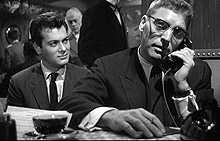 Many of us writers have been publicists and PR people, yet we often have unkind things to say about them. Ultra-powerful columnist and radio host J.J. Hunsecker (Burt Lancaster) is no exception. "Mr. Falco, whom I did not invite to sit at this table tonight, is a hungry press agent, and fully up to all the tricks of his very slimy trade," explains Hunsecker to a senator he is about to blackmail. Later, the poisonous stand-in for real-life media personality Walter Winchell informs us that handsome Sidney Falco (Tony Curtis) is "a cookie full of arsenic." It's true that Falco is so dependent on the columnist's life-or-death power that he is more than willing to break up an innocent love affair between Hunsecker's obsessively-beloved younger sister (Susan Harrison) and an upright jazz guitarist (Martin Milner.) At the same time, we can't help almost rooting for Falco, an absolute nightmare of a PR man; we all know what it's like to be both powerless and greedy. Set against a vibrant New York background created by director Alexander Mackendrick and cinematographer James Wong Howe, and with a screenplay largely by one-time publicist Ernest Lehman, ingeniously Byzantine dialogue by playwright Clifford Odets, and personal-best performances from both of it stars, "Sweet Smell of Success" is one of the first and best films to really look at the corrupting power of an increasingly powerful media and the potentially dangerous role of public relations professionals. PR and media people seem to love it. Go figure.
Many of us writers have been publicists and PR people, yet we often have unkind things to say about them. Ultra-powerful columnist and radio host J.J. Hunsecker (Burt Lancaster) is no exception. "Mr. Falco, whom I did not invite to sit at this table tonight, is a hungry press agent, and fully up to all the tricks of his very slimy trade," explains Hunsecker to a senator he is about to blackmail. Later, the poisonous stand-in for real-life media personality Walter Winchell informs us that handsome Sidney Falco (Tony Curtis) is "a cookie full of arsenic." It's true that Falco is so dependent on the columnist's life-or-death power that he is more than willing to break up an innocent love affair between Hunsecker's obsessively-beloved younger sister (Susan Harrison) and an upright jazz guitarist (Martin Milner.) At the same time, we can't help almost rooting for Falco, an absolute nightmare of a PR man; we all know what it's like to be both powerless and greedy. Set against a vibrant New York background created by director Alexander Mackendrick and cinematographer James Wong Howe, and with a screenplay largely by one-time publicist Ernest Lehman, ingeniously Byzantine dialogue by playwright Clifford Odets, and personal-best performances from both of it stars, "Sweet Smell of Success" is one of the first and best films to really look at the corrupting power of an increasingly powerful media and the potentially dangerous role of public relations professionals. PR and media people seem to love it. Go figure.
"The Apartment" (1960)
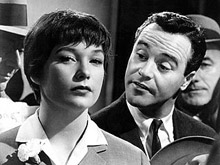 There have been many films about characters selling their soul in the pursuit of easy business success, but none has made use of as neat a metaphor as this comic and very nearly tragic masterpiece. Lonely Manhattanite and corporate wage slave C.C. Baxter (Jack Lemmon) regularly vacates his apartment so that it can be used by his married superiors for private meetings with women not their wives. The strategy might be bad for his self-respect, but it gets C.C. into the junior executive pool. His unusually creative form of sell-out turns out to be a lot more than inconvenient, however, when he stumbles home one Christmas Eve to a pretty elevator operator (Shirley MacLaine) nearly dead from an intentional drug overdose. Complicating matters even more is the fact that he has already fallen for the young woman, who has in turn fallen way too hard for his serpentine boss (Fred MacMurray). One of the greatest films by Hollywood's greatest chronicler of moral compromise, Billy Wilder, "The Apartment" is brilliant comedy, drama and satire, deftly examining the web of power relationships in corporate America that make it necessary to almost literally give up a piece of yourself for the sake of the corporation. To some, Wilder's classic might seem like a relic of "Mad Men"-era moral turpitude. We disagree. The disease has mutated, but it lingers on.
There have been many films about characters selling their soul in the pursuit of easy business success, but none has made use of as neat a metaphor as this comic and very nearly tragic masterpiece. Lonely Manhattanite and corporate wage slave C.C. Baxter (Jack Lemmon) regularly vacates his apartment so that it can be used by his married superiors for private meetings with women not their wives. The strategy might be bad for his self-respect, but it gets C.C. into the junior executive pool. His unusually creative form of sell-out turns out to be a lot more than inconvenient, however, when he stumbles home one Christmas Eve to a pretty elevator operator (Shirley MacLaine) nearly dead from an intentional drug overdose. Complicating matters even more is the fact that he has already fallen for the young woman, who has in turn fallen way too hard for his serpentine boss (Fred MacMurray). One of the greatest films by Hollywood's greatest chronicler of moral compromise, Billy Wilder, "The Apartment" is brilliant comedy, drama and satire, deftly examining the web of power relationships in corporate America that make it necessary to almost literally give up a piece of yourself for the sake of the corporation. To some, Wilder's classic might seem like a relic of "Mad Men"-era moral turpitude. We disagree. The disease has mutated, but it lingers on.
"The Cincinnati Kid" (1965)
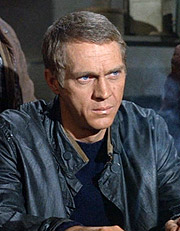 It has its own source material and a colorful setting in Depression-era New Orleans. Even so, this poker drama helmed by the reliable Norman Jewison – stepping in for fired directorial wild card Sam Peckinpah – and co-written by master screenwriters Ring Lardner Jr. and Terry Southern is often considered an unofficial remake of "The Hustler," with Steve McQueen and Edward G. Robinson taking over the roles first created by Paul Newman and Jackie Gleason. Despite an absurdly unlikely final 5 Card Stud hand that may ruin the ending for viewers who've actually played poker, it's an effective enough reiteration of the truism that making it in a man's world is filled with moral traps. In this particular instance, that brings us to "the Kid" (McQueen) a loyal enough friend but a flawed man. He finds himself caught between his dealer buddy (Karl Malden), the victim of a blackmail scheme, his friend's lustful wife (Ann Margaret), his far more worthy girlfriend (Tuesday Weld), and his own slightly flexible sense of honor. That fable-like ending might be problematic, but the reality is that even the best player in the world is the servant of luck.
It has its own source material and a colorful setting in Depression-era New Orleans. Even so, this poker drama helmed by the reliable Norman Jewison – stepping in for fired directorial wild card Sam Peckinpah – and co-written by master screenwriters Ring Lardner Jr. and Terry Southern is often considered an unofficial remake of "The Hustler," with Steve McQueen and Edward G. Robinson taking over the roles first created by Paul Newman and Jackie Gleason. Despite an absurdly unlikely final 5 Card Stud hand that may ruin the ending for viewers who've actually played poker, it's an effective enough reiteration of the truism that making it in a man's world is filled with moral traps. In this particular instance, that brings us to "the Kid" (McQueen) a loyal enough friend but a flawed man. He finds himself caught between his dealer buddy (Karl Malden), the victim of a blackmail scheme, his friend's lustful wife (Ann Margaret), his far more worthy girlfriend (Tuesday Weld), and his own slightly flexible sense of honor. That fable-like ending might be problematic, but the reality is that even the best player in the world is the servant of luck.
"The Spy Who Came in From the Cold" (1965)
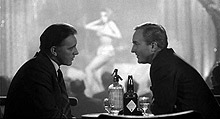 If any career out there is in permanent moral twilight, it's intelligence work. Just for starters, it's a job that's legal in your home country but a capital crime elsewhere. Having been a spy for her majesty's secret service himself, author John Le Carré knew something about that and was moved to pen the basis for this ultimate un-Bond spy film. The plot centers on alcoholic, on-the-skids former MI6 station chief Alec Leamas (Richard Burton), who is given one last chance at career redemption. He is to stage a fake defection and feed disinformation to a sympathetic East German Stasi officer (Oskar Werner) whom he believes will implicate and kill the Nazi-turned-Commie spy chief (Peter van Eyck) who previously killed one of Leamas's men. Danger looms when, while building his cover, Leamas falls in love with a sweet-natured member of the English Communist Party (Claire Bloom). She will eventually be forced to compromise her own most cherished beliefs, and even that will not be sacrifice enough. An uncompromising tale of the bitter ruthlessness of the Cold War, Martin Ritt's brilliant adaptation of one of the best espionage novels ever written is a stark reminder that even honorable patriotic activity sometimes involves lying, manipulation, killing, cruelty and cowardice.
If any career out there is in permanent moral twilight, it's intelligence work. Just for starters, it's a job that's legal in your home country but a capital crime elsewhere. Having been a spy for her majesty's secret service himself, author John Le Carré knew something about that and was moved to pen the basis for this ultimate un-Bond spy film. The plot centers on alcoholic, on-the-skids former MI6 station chief Alec Leamas (Richard Burton), who is given one last chance at career redemption. He is to stage a fake defection and feed disinformation to a sympathetic East German Stasi officer (Oskar Werner) whom he believes will implicate and kill the Nazi-turned-Commie spy chief (Peter van Eyck) who previously killed one of Leamas's men. Danger looms when, while building his cover, Leamas falls in love with a sweet-natured member of the English Communist Party (Claire Bloom). She will eventually be forced to compromise her own most cherished beliefs, and even that will not be sacrifice enough. An uncompromising tale of the bitter ruthlessness of the Cold War, Martin Ritt's brilliant adaptation of one of the best espionage novels ever written is a stark reminder that even honorable patriotic activity sometimes involves lying, manipulation, killing, cruelty and cowardice.
"The Color of Money" (1986)
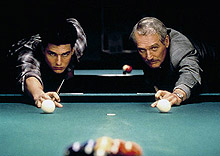 When word got around that Martin Scorsese, of the decidedly dark "Taxi Driver" and "Raging Bull," was directing a sequel to "The Hustler," few probably expected the film to be significantly more hopeful than the original, and an enjoyably slick entertainment to boot. Paul Newman, finally winning an Oscar for his second turn as Eddie Felsen, plays the ex-hustler and would-be pool champ a few decades after being forcibly retired from the game. Now a fairly successful salesmen of cheap booze to billiard halls and other dives, he spots Vincent (Tom Cruise), an incredibly talented, but not incredibly intelligent, young player whose mixture of great skill, an absurd pompadour haircut, and general goofiness makes him a potentially outstanding pool hustler. Since Vincent is more interested in simply winning games than manipulating pigeons to make ready cash, Eddie keeps him in check by running something akin to a con with Carmen (Mary Elizabeth Mastrantonio), the affectionate but less than completely honest girlfriend Vincent adores. Eventually, however, Eddie realizes he's more of a sucker like Vincent than he lets on, and that he's just as obsessed with the pursuit of excellence of its own sake. On the downside of middle-age, Eddie has finally overcome the darkness of his art.
When word got around that Martin Scorsese, of the decidedly dark "Taxi Driver" and "Raging Bull," was directing a sequel to "The Hustler," few probably expected the film to be significantly more hopeful than the original, and an enjoyably slick entertainment to boot. Paul Newman, finally winning an Oscar for his second turn as Eddie Felsen, plays the ex-hustler and would-be pool champ a few decades after being forcibly retired from the game. Now a fairly successful salesmen of cheap booze to billiard halls and other dives, he spots Vincent (Tom Cruise), an incredibly talented, but not incredibly intelligent, young player whose mixture of great skill, an absurd pompadour haircut, and general goofiness makes him a potentially outstanding pool hustler. Since Vincent is more interested in simply winning games than manipulating pigeons to make ready cash, Eddie keeps him in check by running something akin to a con with Carmen (Mary Elizabeth Mastrantonio), the affectionate but less than completely honest girlfriend Vincent adores. Eventually, however, Eddie realizes he's more of a sucker like Vincent than he lets on, and that he's just as obsessed with the pursuit of excellence of its own sake. On the downside of middle-age, Eddie has finally overcome the darkness of his art.
"Wall Street" (1987)
 Stop us if you've heard this before. "Greed, for lack of a better work, is good," or so said Gordon Gekko (Michael Douglas). Co-writer and director Oliver Stone clearly saw Gekko as a charming and attractive villain, but many apparently saw only the charm and attraction. "Wall Street" became an unintended inspiration for a whole new generation of traders, many of whom may not have been very concerned about the ethical and economic ramifications of the illegal market manipulation that was the movie's actual subject. Indeed, the controversial filmmaker had a perfect excuse to make a sequel 23 years later when tomfoolery on the Street appears to have led to the near collapse of the world economy. In the first film, Gekko is seen primarily through the eyes of young investment firm account executive Bud Fox (a shockingly healthy-looking, 21-year-old Charlie Sheen) who allows himself to be goaded into offering inside information gleaned from his father (Martin Sheen), a foreman and union president at a financially shaky airline. The consequences of that small act turn out to be nearly disastrous. If anything, "Wall Street" is overly neat in allowing Fox to atone and regain his moral footing. Stone's film nevertheless does a good job of portraying the particular mix of unvarnished avarice and self-congratulatory hype that seems to power the folks who make millions, and now billions, by making absolutely nothing. It's just a shame that the movie makes it look so fun.
Stop us if you've heard this before. "Greed, for lack of a better work, is good," or so said Gordon Gekko (Michael Douglas). Co-writer and director Oliver Stone clearly saw Gekko as a charming and attractive villain, but many apparently saw only the charm and attraction. "Wall Street" became an unintended inspiration for a whole new generation of traders, many of whom may not have been very concerned about the ethical and economic ramifications of the illegal market manipulation that was the movie's actual subject. Indeed, the controversial filmmaker had a perfect excuse to make a sequel 23 years later when tomfoolery on the Street appears to have led to the near collapse of the world economy. In the first film, Gekko is seen primarily through the eyes of young investment firm account executive Bud Fox (a shockingly healthy-looking, 21-year-old Charlie Sheen) who allows himself to be goaded into offering inside information gleaned from his father (Martin Sheen), a foreman and union president at a financially shaky airline. The consequences of that small act turn out to be nearly disastrous. If anything, "Wall Street" is overly neat in allowing Fox to atone and regain his moral footing. Stone's film nevertheless does a good job of portraying the particular mix of unvarnished avarice and self-congratulatory hype that seems to power the folks who make millions, and now billions, by making absolutely nothing. It's just a shame that the movie makes it look so fun.
"Glenggarry Glen Ross" (1992)
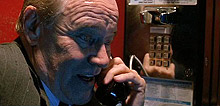 "Coffee's for closers only," Alec Baldwin as the ultimate yuppie scum Blake informs aging, hard-luck salesmen Shelly "the Machine" Levine (Jack Lemmon) in the single most famous rant of writer David Mamet's rant-filled career. In a speech not featured in Mamet's original play, James Foley's film version illustrates the sheer insanity of trying to frighten a bunch of already downtrodden men into becoming confident enough to make more sales. That's obviously just the beginning of the tortures and indignities that Mitch and Murray's lead-deprived crew will suffer in this classic exploration of the ephemeral nature of success and failure. The film shows us that process destroying some, Levine in particular, and ennobling Al Pacino's on-a-roll Ricky Roma. We know, however, that Levine – now stressed beyond reason by his daughter's illness and the financial costs thereof – was once on a mighty roll himself. We also know that a sales slump is only a few bad sits away from Mr. Roma. Sure, some of it is skill, intelligence, and even hard work, but there's always luck and one's own slippery psychology to contend with. You can quit working at the office with the seriously unproductive approach to employee motivation, but there's no way off the merry-go-round of success and failure. Still, if you're going to sell real estate, it's best if it's not the proverbial swampland in Florida.
"Coffee's for closers only," Alec Baldwin as the ultimate yuppie scum Blake informs aging, hard-luck salesmen Shelly "the Machine" Levine (Jack Lemmon) in the single most famous rant of writer David Mamet's rant-filled career. In a speech not featured in Mamet's original play, James Foley's film version illustrates the sheer insanity of trying to frighten a bunch of already downtrodden men into becoming confident enough to make more sales. That's obviously just the beginning of the tortures and indignities that Mitch and Murray's lead-deprived crew will suffer in this classic exploration of the ephemeral nature of success and failure. The film shows us that process destroying some, Levine in particular, and ennobling Al Pacino's on-a-roll Ricky Roma. We know, however, that Levine – now stressed beyond reason by his daughter's illness and the financial costs thereof – was once on a mighty roll himself. We also know that a sales slump is only a few bad sits away from Mr. Roma. Sure, some of it is skill, intelligence, and even hard work, but there's always luck and one's own slippery psychology to contend with. You can quit working at the office with the seriously unproductive approach to employee motivation, but there's no way off the merry-go-round of success and failure. Still, if you're going to sell real estate, it's best if it's not the proverbial swampland in Florida.
"Swimming with Sharks" (1994)
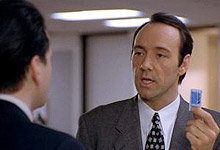 Starting with "Sunset Boulevard" and "The Bad and the Beautiful," there have been many movies about the psychological dangers of working in the human Cuisinart we call Hollywood. Though director George Huang's feature debut might be on a vastly lower level than those classics, no other film we know depicts the world from the point of view of its low-ranking foot soldiers with anything like this level of accuracy and intensity. Starring Frank Whaley as recent film school graduate Guy, the ambitious but terrified assistant to hot-shot studio producer Buddy Ackerman (Kevin Spacey), "Swimming with Sharks" is a case study in workplace dynamics by way of Dick Cheney and John Yoo. It's also one that this humble writer knows to be accurate. It might not be every boss in Hollywood who will loudly berate an employee at length for giving him the pink kind of artificial sweetener when he prefers the blue kind, but its close enough. In any case, the real message one gets in such jobs is that making movies is such a desirable thing to be involved with that even having a sense of sense might be a disqualifier for success in "the business." There's always someone willing to take the abuse waiting right outside.
Starting with "Sunset Boulevard" and "The Bad and the Beautiful," there have been many movies about the psychological dangers of working in the human Cuisinart we call Hollywood. Though director George Huang's feature debut might be on a vastly lower level than those classics, no other film we know depicts the world from the point of view of its low-ranking foot soldiers with anything like this level of accuracy and intensity. Starring Frank Whaley as recent film school graduate Guy, the ambitious but terrified assistant to hot-shot studio producer Buddy Ackerman (Kevin Spacey), "Swimming with Sharks" is a case study in workplace dynamics by way of Dick Cheney and John Yoo. It's also one that this humble writer knows to be accurate. It might not be every boss in Hollywood who will loudly berate an employee at length for giving him the pink kind of artificial sweetener when he prefers the blue kind, but its close enough. In any case, the real message one gets in such jobs is that making movies is such a desirable thing to be involved with that even having a sense of sense might be a disqualifier for success in "the business." There's always someone willing to take the abuse waiting right outside.
"The Devil's Advocate" (1997)
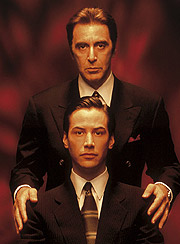 A lot of us who saw 1993's "The Firm" were awfully disappointed when the deep, deadly secret of Bendini, Lambert and Locke was that its lawyers were involved with, wait for it, the Mob. Given the hubbub and exaggerated sense of dread, nothing less than a direct connection to Satan himself would really do the job. And that's why we kind of love Taylor Hackford's silly and entertaining vehicle for Al Pacino at his hammy apex. Keanu Reeves, in one of his non-terrible acting roles, is Kevin Lomax, a smooth young Florida attorney who finds himself working for a firm headed by a fellow named John Milton. Lomax, who apparently didn't study English Literature during his undergrad days, takes a long time to figure out that Milton is actually the scene-stealing villain of Paradise Lost himself. It might be an over-the-top conceit to have a lawyer literally be the devil, but there's little doubt that many corporate lawyers are doing work that places them far from the side of the angels. Moreover, the temptations and hazards placed before Lomax and his vulnerable wife (Charlize Theron) resonate all too closely with the "golden handcuffs" lifestyle of real world corporate lawyers.
A lot of us who saw 1993's "The Firm" were awfully disappointed when the deep, deadly secret of Bendini, Lambert and Locke was that its lawyers were involved with, wait for it, the Mob. Given the hubbub and exaggerated sense of dread, nothing less than a direct connection to Satan himself would really do the job. And that's why we kind of love Taylor Hackford's silly and entertaining vehicle for Al Pacino at his hammy apex. Keanu Reeves, in one of his non-terrible acting roles, is Kevin Lomax, a smooth young Florida attorney who finds himself working for a firm headed by a fellow named John Milton. Lomax, who apparently didn't study English Literature during his undergrad days, takes a long time to figure out that Milton is actually the scene-stealing villain of Paradise Lost himself. It might be an over-the-top conceit to have a lawyer literally be the devil, but there's little doubt that many corporate lawyers are doing work that places them far from the side of the angels. Moreover, the temptations and hazards placed before Lomax and his vulnerable wife (Charlize Theron) resonate all too closely with the "golden handcuffs" lifestyle of real world corporate lawyers.
"Rounders" (1998)
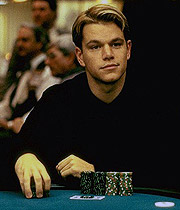 Director John Dahl's tale of poker on the edge owes more than a little to "The Hustler," "The Cincinnati Kid" and even "The Color of Money." On the other hand, aspiring poker champ Mike McDermott (Matt Damon) is an interesting update on characters like Fast Eddie Felsen and the Kid. It's not just that the game has changed to Texas Hold 'Em, it's that he really doesn't fit the marginal profile that was once standard for protagonists whose jobs involved gambling in places that sell alcohol. Not only did Mike actually go to college, he's working on his law degree, at least for the time being. That's not to say he doesn't flirt with the legal and moral dark side; he’s recovering from an extremely bitter defeat by an ill-tempered Russian gangster (John Malkovich) and is pushed out of retirement by his deeply loyal and well-nicknamed ex-con best friend, Lester "Worm" Murphy (Edward Norton). In reality, the film makes clear that poker is not actually the moral hazard, but certain kinds of poker players can be. That's why young Mike must ultimately strike out on his own and keep his own counsel, forever aware that his destiny is tied to the poker table and a certain degree of luck.
Director John Dahl's tale of poker on the edge owes more than a little to "The Hustler," "The Cincinnati Kid" and even "The Color of Money." On the other hand, aspiring poker champ Mike McDermott (Matt Damon) is an interesting update on characters like Fast Eddie Felsen and the Kid. It's not just that the game has changed to Texas Hold 'Em, it's that he really doesn't fit the marginal profile that was once standard for protagonists whose jobs involved gambling in places that sell alcohol. Not only did Mike actually go to college, he's working on his law degree, at least for the time being. That's not to say he doesn't flirt with the legal and moral dark side; he’s recovering from an extremely bitter defeat by an ill-tempered Russian gangster (John Malkovich) and is pushed out of retirement by his deeply loyal and well-nicknamed ex-con best friend, Lester "Worm" Murphy (Edward Norton). In reality, the film makes clear that poker is not actually the moral hazard, but certain kinds of poker players can be. That's why young Mike must ultimately strike out on his own and keep his own counsel, forever aware that his destiny is tied to the poker table and a certain degree of luck.
"The Devil Wears Prada" (2006)
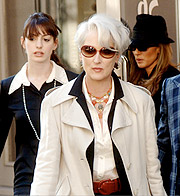 Both fashion and publishing are known for being tough businesses, so it makes perfect sense that fashion publishing would attract a boss-from-hell like the mercurial Miranda Priestly (Meryl Streep, brilliantly not attempting to imitate real-life "devil" Anna Wintour). Though worse tortures have been inflicted on hapless young employees than what Andy Sachs (Anne Hathaway) endures, the film repeatedly asks: is it all worth it? Is there a point to the kind of clothing that costs more than most of us would spend on a car? Is there a point in working for a boss so demanding that we can't even make our significant other's birthday party? The answer seems to be, if you think there is, then, maybe. And then there's the issue of what to make of a boss who would demand that her employee find a flight to Florida in the middle of a hurricane or demand an as-yet-unpublished Harry Potter novel for her daughters to read on a trip. Is working in this way a suitable way for anyone to spend their life? Because the movie is made by people who are in an at least equally insane business and who have likely had bosses that make Ms. Priestly look like pushovers, the answer, again, is "maybe." Is there something wrong with that? Maybe.
Both fashion and publishing are known for being tough businesses, so it makes perfect sense that fashion publishing would attract a boss-from-hell like the mercurial Miranda Priestly (Meryl Streep, brilliantly not attempting to imitate real-life "devil" Anna Wintour). Though worse tortures have been inflicted on hapless young employees than what Andy Sachs (Anne Hathaway) endures, the film repeatedly asks: is it all worth it? Is there a point to the kind of clothing that costs more than most of us would spend on a car? Is there a point in working for a boss so demanding that we can't even make our significant other's birthday party? The answer seems to be, if you think there is, then, maybe. And then there's the issue of what to make of a boss who would demand that her employee find a flight to Florida in the middle of a hurricane or demand an as-yet-unpublished Harry Potter novel for her daughters to read on a trip. Is working in this way a suitable way for anyone to spend their life? Because the movie is made by people who are in an at least equally insane business and who have likely had bosses that make Ms. Priestly look like pushovers, the answer, again, is "maybe." Is there something wrong with that? Maybe.
"The Social Network" (2010)
 One minority group that has been severely under-represented in films about the dark side of careerism are, of course, geeks. No more. Jessie Eisenberg's Asperbergerish portrayal of Facebook co-creator Mark Zuckerberg took this particular flavor of revenge of the nerds to the best kind of extreme in a movie that, in a very traditional way, mourned how human relationships could be ruined by success. The irony being that Eisenberg's fictionalized version of Zuckerberg appears to not actually care that much about those relationships and that his lack of caring about people may be crucial to what he's achieved; a fact made only more ironic in that he’s developing a giant Internet engine devoted to creating a simulacrum of friendship. Aaron Sorkin's Oscar-winning screenplay and David Fincher' neo-noirish direction may have resonated largely because it showed a picture of people working and communicating in isolation, together. That is, of course, exactly what all of us who read and write on the 'net are doing – like right now. Is there something inherently dark and marginal about that? It may not matter. It's what we're doing.
One minority group that has been severely under-represented in films about the dark side of careerism are, of course, geeks. No more. Jessie Eisenberg's Asperbergerish portrayal of Facebook co-creator Mark Zuckerberg took this particular flavor of revenge of the nerds to the best kind of extreme in a movie that, in a very traditional way, mourned how human relationships could be ruined by success. The irony being that Eisenberg's fictionalized version of Zuckerberg appears to not actually care that much about those relationships and that his lack of caring about people may be crucial to what he's achieved; a fact made only more ironic in that he’s developing a giant Internet engine devoted to creating a simulacrum of friendship. Aaron Sorkin's Oscar-winning screenplay and David Fincher' neo-noirish direction may have resonated largely because it showed a picture of people working and communicating in isolation, together. That is, of course, exactly what all of us who read and write on the 'net are doing – like right now. Is there something inherently dark and marginal about that? It may not matter. It's what we're doing.
You can follow us on Twitter and Facebook for content updates. Also, sign up for our email list for weekly updates and check us out on Google+ as well.











